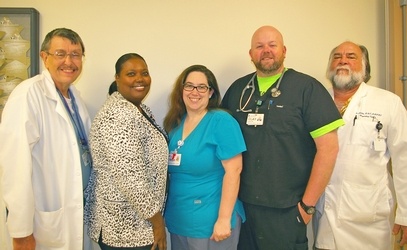Lane Regional Medical Center has earned Quality Respiratory Care Recognition (QRCR) under a national program aimed at helping patients and families make informed decisions about the quality of the respiratory care services available in hospitals.
This is the 9th straight year Lane Regional has earned this prestigious recognition. Only 15% of hospitals in the United States received this award.
Hospitals earning the QRCR designation ensure patient safety by agreeing to adhere to a strict set of criteria governing their respiratory care services.
To qualify for recognition, Lane Regional provided documentation showing it meets the following conditions:
- All respiratory therapists employed by the hospital to deliver bedside respiratory care services are either legally recognized by the state as competent to provide respiratory care services or hold the CRT or RRT credential.
- Respiratory therapists are available 24 hours.
- Other personnel qualified to perform specific respiratory procedures and the amount of supervision required for personnel to carry out specific procedures must be designated in writing.
- A doctor of medicine or osteopathy is designated as medical director of respiratory care services.
- Hospital policy prohibits the routine delivery of medicated aerosol treatments utilizing small volume nebulizers, metered dose inhalers, or intermittent positive pressure treatments to multiple patients simultaneously. Circumstances under which this practice is permitted is defined by policy.
- Use a process that periodically compares
performance of your respiratory department on efficiency and quality metrics with similar departments for the purpose of identifying an achieving best practice.
"I am very proud of our Respiratory Therapists for providing the exceptional care this award reflects," said Mike Hlavac, RRT, director of Therapy Services.
Respiratory therapists are specially trained health care professionals who work under physician's orders to provide a wide range of breathing treatments and other services to people with asthma, chronic obstructive pulmonary disease, cystic fibrosis, lung cancer, AIDS and other lung or lung-related conditions. They also care for premature infants and are key members of lifesaving response teams.
The QRCR program was started in 2003 by the American Association for Respiratory Care, a membership organization representing more than 50,000 health professionals involved in respiratory care nationwide.




